How I (almost) became a hydrologist
Contributed by Anders Persson, a HEPEX guest columnist for 2014
As you can imagine by the headline, I am not a hydrologist, but a meteorologist.
I was employed at SMHI in Sweden in 1967 and have since then been involved in forecasting problem, both operationally and theoretically. During 1983-2011 I enjoyed on and off positions at ECMWF, full time from 1991 to 2001. However, it took some time before I develop an interest in hydrology.
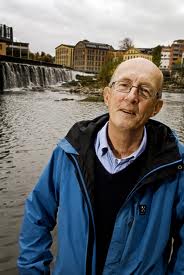
The Swedish HBV model was always close to my heart, but that was because got to know Sten Bergström (the father of the HBV model) in 1972 and then followed his career through frustrations, setbacks and final successes.
A deeper relationship with hydrology came first thirty years later. During a coffee break with Göran Lindström (or was it Martin Häggström?) I learned that hydrologists at SMHI were not entirely satisfied with the rainfall forecasts they received from ECMWF through the meteorologists.
–Have you tried “ensemble forecasts”? I wondered
–No, we understand they are not so good, was the answer I got.
Now I really became curious.
During the ensuing conversation it transpired that the hydrologists had not been properly informed about the “ensembles” by the, at the time, sceptical meteorologists. I did my best to give my version and to my surprise, it took only ten minutes for the hydrologists to understand what I had sought to explain to the meteorologists for ten years. So when the hydrologists at SMHI shortly afterwards decided to modernize their forecast service the ECMWFs ensembles became the meteorological backbone of the system.
It was a pleasure over the next few years (along with my colleague Per Kållberg) to provide meteorological expertise to our hydrological colleagues. Particularly stimulating was their culture. They seemed to work for a common good. I did not notice any of the rivalry and infighting between theoreticians and practitioners which poisoned forecast meteorology. In hydrology, physicists and statisticians seemed to work in harmony and there was no obvious antagonism between computer-based and empirical approaches.
Malin Falkenmark
After a while I felt a need to learn more about hydrology.
The books in the SMHI library were quite thick and technical, but at the city library I found a 60-page booklet by the prominent Swedish hydrologist Malin Falkenmark: “Känn ditt vatten” (“Know your water”).
I knew her name, but now I learned that she has been professor of applied international hydrology at the Natural Science Research Council since 1986 and held many other prestigious international positions. It did not take many pages into the book before I realized that this was not any normal popular science book. The language was vivid, smooth and easy, the content interesting in the way that the book became a “page turner “. She achieved this not only through her deep knowledge of the subject but also by an ability to highlight contradictions, paradoxes and counterintuitive features. In other words, she succeeded to present hydrology as an exciting science.
According to my diary, it was during the weekend 17-18 July 2004 I read the book sitting in our summerhouse. Outside the rain was pouring down. When I came to work on Monday, I learned that large parts of southernmost Sweden had been hit by serious flooding. The newspapers were calling in, but the few hydrologists who were not on summer vacation had to prioritize the warning service. Here I saw my chance:
- Let me handle the journalists. After reading Malin’s book, I know “everything” about hydrology!
Said and done, I took on the onslaught from the journalist horde and even managed to make the country’s largest newspaper publish a probability map from the ensemble system. It showed that hydrologist had indeed warned about floodings well in advance.
Probability map posted in Dagens Nyheter 2004
When, at the end of the week, the dust settled, I was appointed “honorary hydrologist” and it was decided that next summer I would function as some kind of hydrological “press ombudsman”.
But the summer of 2005 was dry and some trouble with the ECMWFs ensemble system kept me fully occupied on the meteorological side for most of the time. My potential defection from meteorology to hydrology dried up.
Hydrologists at SMHI in 2006
The new hydrological forecasting service stood ready in 2006.When I had visitors at SMHI, I proudly first took them there. One day I had the pleasure to show it to my colleague from various WMO missions, Paul Davies from Exeter. Paul told me that the British were developing something similar and were interested in our experiences.
In spring 2008 the hydrologists arranged a big party celebrating 100 years of hydrology at SMHI. Again I was struck by the cultural difference with meteorologists.
During the entertainment theorists brought down applauds with funny stories about programming error and the frustration of dropping thousands of computer card in a mess on the floor. They were succeeded by sturdy weathered colleagues who told exciting stories from Lapland campaigns about dangerous bears and life threatening spring floods.
A similar “come together party” had not been possible in the meteorological community where theorists and practitioners, if indeed they can remain in the same room, tend to stay at opposite ends.
But again my potential hydrological career was thwarted by a meteorological engagement, this time at the Met Office in Exeter. It turned out to be emotionally and intellectually the most satisfying part of my professionally career. But that is another story . . .
Next post: 21 March 2014.
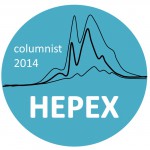 Anders will be contributing to this blog over the year. Follow his columns here.
Anders will be contributing to this blog over the year. Follow his columns here.
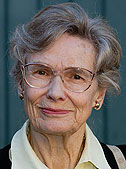
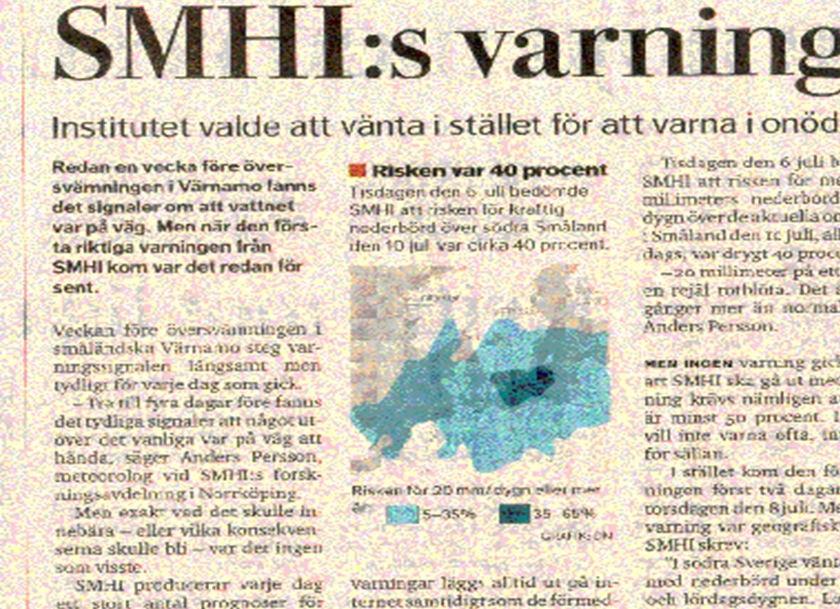
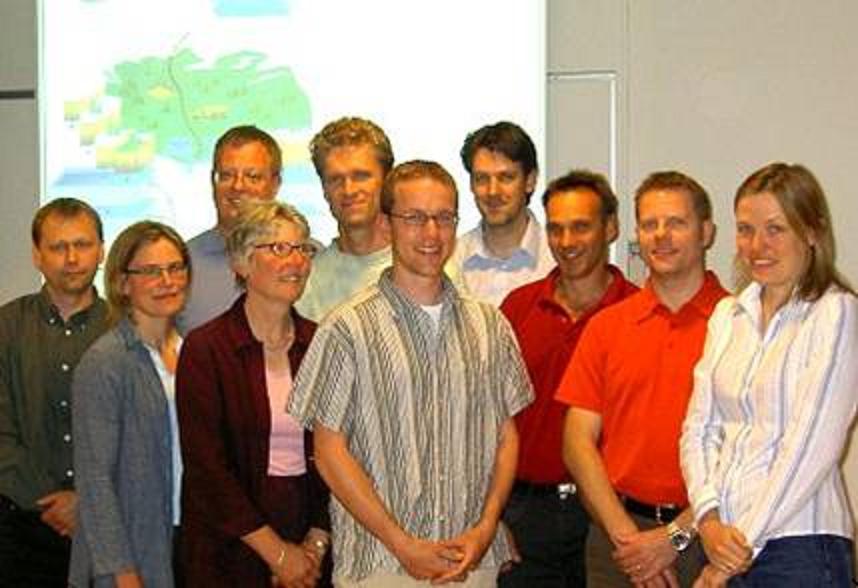
January 24, 2014 at 10:39
Kind words by Anders about Hydrologists – thanks! Not so sure about the “hydrology, physicists and statisticians seemed to work in harmony “. We have vivid discussions/disagreement on how ‘physically’ based a model can be or how uncertainty is adequately represented, just to name a few. I believe that Anders is right in the (mostly) open attitude by hydrologists to uncertainty (although I believe that is now a days also true for most meterologists) , which comes partially out of the data availability for our science. The latter is closely connected to the resolution issue (can we really model hyper resolution?) and where the differences between hydrologists and meteorologists become most apparent (for discussion see http://goo.gl/puQqHx) – but even within hydrology we disagree (see http://goo.gl/57bTgu and http://nora.nerc.ac.uk/21178/).
January 24, 2014 at 12:10
To “work in harmony” doesn’t mean that everybody agrees with everybody. “Vivid discussions/disagreements” is in my view an essential requirement for “work harmony”. So why is it different in forecasting meteorology? Well, let me put it in this why: during the 40+ years I have known Sten Bergström and his colleagues I have never heard any of them say that “once we’ve got the HBV-model up and running there will be no need for operational hydrologists any more”.
But this is what meteorological forecasters have been told the last 50 years. I heard in for the first time in 1966, when I came to the university, that thanks to the computer models “in 5-10 years time there will be no need for weather forecasters”. I decided not to believe in it, but most of my colleagues did and they developed , quite naturally, a hostile attitude to numerical weather prediction.
January 28, 2014 at 01:26
I enjoyed reading your insights in the development of ensemble forecasting within SMHI, and perspective on the relatively open nature of hydrologists toward different viewpoints and traditions (and I would agree, that doesn’t rule out arguments). Hydrologists are often a minority group within meteorological institutes — perhaps that helps them stick together?
I’d like to comment that hydrologic forecasting does contain a disagreement analogous to the one you describe in meteorological forecasting (ie on whether objective, automated approaches can offer similar value to human forecasters, and possibly one day replace them). The issue barely simmers because hydrologists are only just now implementing the types of centralized, forecaster-over-the-loop prediction systems that could offer competing information to the common forecaster-in-the-loop systems. In the US at least, we don’t yet have much ‘NHP’ to parallel multi-center NWP, and the role of the hydrologic forecaster is not openly in question. But I think it is only a matter of time before the quality of automated/objective NHP systems advances, and their information products expand and attract a broader range of users. I hope that hydrological forecasting community will see such systems more as opportunities (ie new tools) than threats to a traditional approach to forecasting, and that the debate will in any case be as good-natured as your post suggests. I would be highly surprised if the need for human forecasters were to decline, though their role and required expertise is likely to evolve.
January 28, 2014 at 16:57
I didn’t believe in the talk of the demise of the traditional forecaster “within 5-10 years” because those who said so didn’t show much interest in weather forecasting,
even less about the operational monitoring, verification and post-processing that would have been necessary for an automatic service.
When I 10 years ago did some research into the history of numerical weather prediction (NWP) I found evidence that supported my suspicion that it had all been a political ploy to secure funding. The authorities didn’t trust promises about b e t t e r forecasts as much as c h e a p e r forecasts.
In the late 80’s I developed an embryo to an adaptive system to correct for systematic errors in the NWP. With a tongue in cheek I told the NWP guys that their Dream about an automatic weather service would soon come true. But they got a bit scared and suddenly started to find arguments to keep human forecasters!
My view is that the more advanced the computer forecast systems are the more well-educated forecasters we need. See my two webinars at http://www.youtube.com/channel/UCuu6EodABZyujnbeSHpCHYA why forecasting should not be seen as an internal quiz show or an introvert competition between man and machine. We are to help the outside world to facilitate decision making. And decision making using NWP is not just a matter of reading off deterministic computer output.